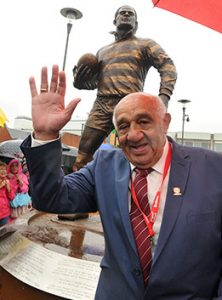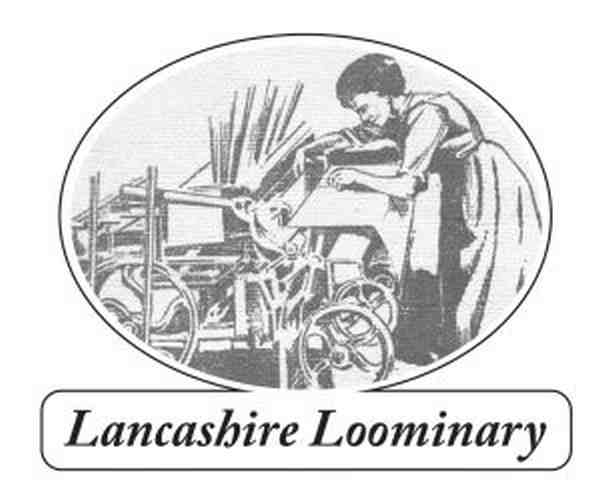The North’s Game: Rugby League, Identity and Northern-ness By Ian Martin
The social history of Rugby League is one of the most inspiring examples of progressive self-determination by working class communities in the industrial North. It’s a culture rooted here that is now also alive and progressing in Australia, New Zealand, Papua New Guinea, Fiji, Tonga, Samoa, France, Lebanon, Jamaica, Canada, USA, Brazil and more. It was a culture that many see as having strong democratic socialist foundations. The founding values and social history of Rugby League are an inspiration to anyone committed to a vibrant, progressive and self-reliant North – or Northumbria.
Rugby League was created by people far away from the dominant national capital of the time. It could only happen because people decided to do more than just have a whinge – and instead sort things out for themselves.

It was to be very different from the game that was led by the London-based establishment. When Rugby League was created, it embraced people who were excluded by this elite – and did what was necessary to ensure they could be included. Rugby League was created as an act of dissent, of rebellion.
On the 29th August 1895, 20 rugby football clubs met at the George Hotel in Huddersfield and formed the Northern Rugby Football Union, which became the Rugby Football League in 1922. All 20 clubs were rooted in industrial communities in Yorkshire, Cheshire and Lancashire and all wanted to be able to make ‘broken time’ payments to players who had to take time off work to be able to train and play. This was against the rules of the London based Rugby Football Union and effectively discriminated against those who were otherwise unable to afford to take time off work.
This radical move was later reflected in the many people involved in Rugby League in the North who were also involved in progressive political causes, from Batley player Dai Davies and Hull director Joe Latus who both fought with the international brigades in the Spanish Civil War to Rugby League magazine editors Stan Chadwick who was involved in the Independent Labour Party and Communist Party member Norman Berry. The Nazi collaborationist regime in Vichy France were so aware of the game’s progressive potential that Rugby a Treize was made illegal and all its assets handed over to Rugby (a Quinze ie. rugby union). Leading figures in the campaign to make rugby a XIII legal again after the war included resistance fighter Paul Barriere, after whom the Rugby League World Cup is named.
Northumbria continues to be the heartland of the game in the Northern Hemisphere and the vast majority of those playing and coaching in its clubs grew up in its deep Rugby League culture, an infrastructure of schools, junior clubs, amateur clubs, businesses, media and supporters who are all an essential element of that culture. At the same time, professional clubs across the UK, France, Canada, USA, Papua New Guinea, Fiji, Australia and New Zealand have also benefited at various times from the playing, coaching and other abilities of people who learned the game here.
The North is therefore the birthplace of a sport that has been adopted by people around the world. It gives many parts of the region an essential part of their identity and something about which to be proud. In fact, 2019’s Rugby League Dividend report found that Rugby League “provides a sense of belonging and identity even to those individuals who do not identify as Rugby League fans.”
For some people throughout Rugby League’s history, the game’s distinctiveness has been about what happens on the pitch. And there was a time when that might have been obvious. A sport that could only survive by being entertaining enough to get people without lots of money to hand some of it over at the gates. And in doing so, recompense the players for the broken time from their regular job. Often in the same role and location as the fans themselves. An attitude in stark contrast with Bertram Fletcher Robinson’s 1895 statement that rugby union’s gentlemen did not wish to “pander to the howling mob that crowd the circular stands of some Yorkshire coliseum.”
And yet, it was exactly that demographic and those places that stood up for broken time and who welcomed and made into heroes, players like Roy Francis, Billy Boston and Clive Sullivan whose careers had been capped by their African heritage in their Welsh birth towns. The people who made these things happen weren’t in London, they were here in the industrial Northern towns that sustained the game.
This is all within the context of Rugby League’s leading role amongst all sports in breaking down barriers to ideas of what constitutes a national hero. For example, Steve Matene, was the first Maori to captain any New Zealand national sports team. Arthur Beetson was the first indigenous Australian to captain any Australian national sports team and the first black Briton to captain any British national sports team was Clive Sullivan. They were all Rugby League players. So too the first black professional sports coach in the UK, Roy Francis, and Ellery Hanley, the first black coach of a national sporting team in the UK.
Nevertheless there is still some way to go to make Rugby League a truly racially just sport. For many people, they would have had little chance of ever knowing about a man like Roy Francis without Carolyn Hitt’s BBC Wales documentary The Rugby Codebreakers – An epic story of race, class, privilege, hypocrisy, rebellion and the sheer ecstasy of scoring a try that challenged the London Hegemony’s narrative of racist, working class Northerners. Interestingly though Hitt’s final line described how it was “the English who embraced (the working class Welshmen of all races) and hold them in their hearts to this very day.” A description that doesn’t adequately do justice to the distinctiveness and identity of people in Rugby League towns in the industrial North.
Given that England and Great Britain Rugby League teams throughout most of their history have mostly been made up of working class Northerners playing the game they gave to the world, for many others this is the closest that they have felt to an international sporting identity. For people here, their only international Rugby League representative team has always been called ‘Great Britain’ or ‘England’, but their love of Rugby League is such that if they were called Elmet, Yorkshire, Northumbria, Europe or whatever, they’d still want to see them in action.
In fact, even when cheering on the ‘Great Britain’ team, symbols of its establishment have been rejected in favour of regional identity, such as in 1933 at Bradford’s Odsal Stadium when the home crowd rejected “God Save The Queen” before Great Britain v Australia and chose instead to sing “On Ilkley Moor” (as described by Anthony Clavane in his book, ‘A Yorkshire Tragedy’).
The team has also provided industrial working class communities in Northumbria with opportunities to represent its distinctive perspective on the political issues of the day, such as in 1992 when players and fans covered up the British Coal sponsors logo on the Great Britain Rugby League shirt in protest at pit closures.
Many of the areas that sustained Rugby League through the dark times are themselves now struggling to move forward past the impact of economic and demographic change. Which in itself is affecting the status of the local club. According to Rugby League historian Tony Collins, Hunslet lost over 50% of its population between 1951 and 1981. This reduction in local population had an unsurprising effect on the club. Although the record attendance for the Myrtle and Flame was 24,000 at the old Parkside for a cup match in 1924, the club have been averaging less than a thousand paying supporters per game in recent years at South Leeds Stadium.
There is no doubt that the political schism caused by Brexit gave the Conservative Party a chance to follow in the wake of UKIP and break through during the 2019 General Election in the ‘Red Wall’ of longstanding Labour voting towns, many of which are RL towns. So called ‘Workington Man’ towns. This led to lots of new Tory MPs who wanted to keep their seats understanding the significance of RL. In fact, one Conservative enthusiastically championing Rugby League was Jonathan Caine, a Tory baron and Leeds Rhinos fan. Another was Ken Davy, Huddersfield Giants’ chairman and unsuccessful Tory candidate for the town in 2019.
For so long, Rugby League being tightly bound with working class communities in the post-industrial North has been portrayed as a liability by those who want the game to ape rugby union. And yet the Brexit effect led to the longstanding party of the establishment recognising exactly that bond as a strength with which to associate. In fact, when the Government loaned the RFL £16 Million for its member clubs in 2020,
RFL CEO Ralph Rimmer’s described the rationale a “confirmation of why Rugby League is important – our USP – the sport’s significant social impact in northern communities in particular. Rugby League is not a wealthy sport but is rich in the things that matter most – outstanding sporting and life chances in often disadvantaged communities”. At the same time, leading Rugby League journalist Steve Mascord described the Westminster government’s perception of Rugby League as “some sort of de facto welfare agency of the north…. it has been typecast by the government as some sort of public asset, like an old bridge or a church – and therefore condemned to act that way.“
The key question for Rugby League is therefore what happens when London based political parties don’t need marginal Rugby League constituencies to win Westminster elections anymore? Interpreting Rugby League’s founding values for today means working actively towards self-determination (whether regional democracy or independence) so that its future is much less dependent on whether it is noticed and valued in Westminster and much more about taking responsibility here for building something better.
Perhaps Ross Peltier is an indication of that future, of a rooted and progressive North. The Bradford-born Jamaica Rugby League international stood for the Green Party in Birstall during the 2021 local elections.
